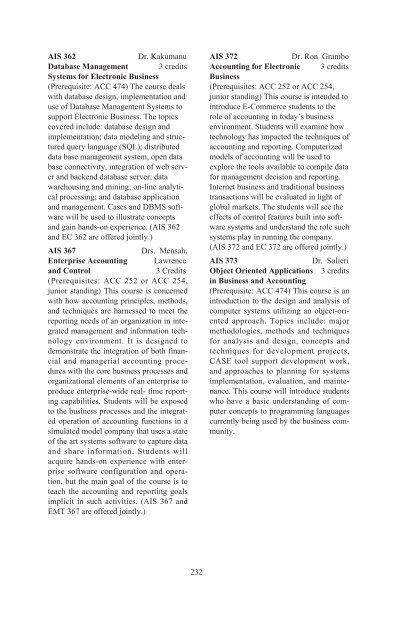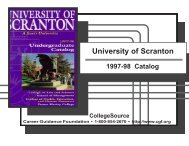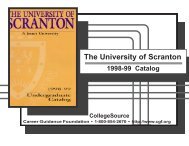2002-2003 - The University of Scranton
2002-2003 - The University of Scranton
2002-2003 - The University of Scranton
Create successful ePaper yourself
Turn your PDF publications into a flip-book with our unique Google optimized e-Paper software.
AIS 362 Dr. Kakumanu<br />
Database Management 3 credits<br />
Systems for Electronic Business<br />
(Prerequisite: ACC 474) <strong>The</strong> course deals<br />
with database design, implementation and<br />
use <strong>of</strong> Database Management Systems to<br />
support Electronic Business. <strong>The</strong> topics<br />
covered include: database design and<br />
implementation; data modeling and structured<br />
query language (SQL); distributed<br />
data base management system, open data<br />
base connectivity, integration <strong>of</strong> web server<br />
and backend database server; data<br />
warehousing and mining; on-line analytical<br />
processing; and database application<br />
and management. Cases and DBMS s<strong>of</strong>tware<br />
will be used to illustrate concepts<br />
and gain hands-on experience. (AIS 362<br />
and EC 362 are <strong>of</strong>fered jointly.)<br />
AIS 367 Drs. Mensah,<br />
Enterprise Accounting Lawrence<br />
and Control 3 Credits<br />
(Prerequisites: ACC 252 or ACC 254,<br />
junior standing) This course is concerned<br />
with how accounting principles, methods,<br />
and techniques are harnessed to meet the<br />
reporting needs <strong>of</strong> an organization in integrated<br />
management and information technology<br />
environment. It is designed to<br />
demonstrate the integration <strong>of</strong> both financial<br />
and managerial accounting procedures<br />
with the core business processes and<br />
organizational elements <strong>of</strong> an enterprise to<br />
produce enterprise-wide real- time reporting<br />
capabilities. Students will be exposed<br />
to the business processes and the integrated<br />
operation <strong>of</strong> accounting functions in a<br />
simulated model company that uses a state<br />
<strong>of</strong> the art systems s<strong>of</strong>tware to capture data<br />
and share information. Students will<br />
acquire hands-on experience with enterprise<br />
s<strong>of</strong>tware configuration and operation,<br />
but the main goal <strong>of</strong> the course is to<br />
teach the accounting and reporting goals<br />
implicit in such activities. (AIS 367 and<br />
EMT 367 are <strong>of</strong>fered jointly.)<br />
232<br />
AIS 372 Dr. Ron Grambo<br />
Accounting for Electronic 3 credits<br />
Business<br />
(Prerequisites: ACC 252 or ACC 254,<br />
junior standing) This course is intended to<br />
introduce E-Commerce students to the<br />
role <strong>of</strong> accounting in today’s business<br />
environment. Students will examine how<br />
technology has impacted the techniques <strong>of</strong><br />
accounting and reporting. Computerized<br />
models <strong>of</strong> accounting will be used to<br />
explore the tools available to compile data<br />
for management decision and reporting.<br />
Internet business and traditional business<br />
transactions will be evaluated in light <strong>of</strong><br />
global markets. <strong>The</strong> students will see the<br />
effects <strong>of</strong> control features built into s<strong>of</strong>tware<br />
systems and understand the role such<br />
systems play in running the company.<br />
(AIS 372 and EC 372 are <strong>of</strong>fered jointly.)<br />
AIS 373 Dr. Solieri<br />
Object Oriented Applications 3 credits<br />
in Business and Accounting<br />
(Prerequisite: ACC 474) This course is an<br />
introduction to the design and analysis <strong>of</strong><br />
computer systems utilizing an object-oriented<br />
approach. Topics include: major<br />
methodologies, methods and techniques<br />
for analysis and design, concepts and<br />
techniques for development projects,<br />
CASE tool support development work,<br />
and approaches to planning for systems<br />
implementation, evaluation, and maintenance.<br />
This course will introduce students<br />
who have a basic understanding <strong>of</strong> computer<br />
concepts to programming languages<br />
currently being used by the business community.
















